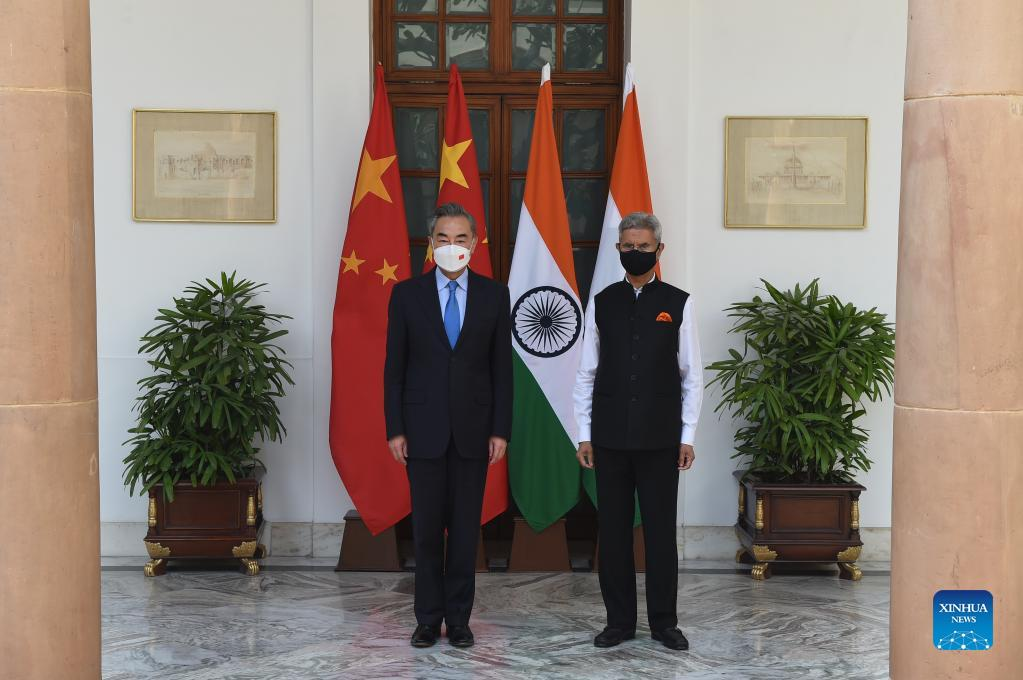
Visiting Chinese State Councilor and Foreign Minister Wang Yi (L) talks with Indian External Affairs Minister Subrahmanyam Jaishankar in New Delhi, India, March 25, 2022. (Xinhua/Zhao Xu)
NEW DELHI, March 25 (Xinhua) -- Visiting Chinese State Councilor and Foreign Minister Wang Yi and Indian External Affairs Minister Subrahmanyam Jaishankar agreed on Friday to strengthen communication for the further development of bilateral ties.
During their meeting in the Indian capital, Wang noted that China and India, which are neighboring ancient civilizations with a combined population of 2.8 billion people, are the two nucleus forces promoting a multipolar world, economic globalization, diversified civilization and greater democracy in international relations.
As the world is entering a time of turbulences and transformations, the two countries should strengthen communication and coordinate their stances in safeguarding their legitimate interests as well as the common interests of the developing countries, so as to make respective contributions to peace and stability in the region and the world as well, Wang said.
For his part, Jaishankar said that India attaches great importance to its relations with China, with no changes made in its strategic assessment of the importance of China.
India is willing to strengthen communication with China and increase mutual trust to get their relationship out of its current low as early as possible, and to enable steady and pragmatic cooperation between the two countries, he said.
Wang said that China and India, as two rational major developing countries, should put their border issue at a proper position in bilateral relations. The border issue should neither define nor affect the overall development of the China-India ties.
The two countries should help eath other fulfill achievements rather than constrain one another, and should support rather than reject each other, he said.
The Chinese foreign minister noted that the two countries should adhere to the important consensus reached between their leaders that China and India should not be a threat to each other, but an opportunity for each other's development.
The two countries should properly resolve the border issue and well manage their differences so as to promote bilateral relations, he said.
In the meeting, Jaishankar said that his country and China have maintained effective communication via diplomatic and military channels since last year. After rounds of the Corps Commander Level Meeting and meetings of the Working Mechanism for Consultation and Coordination on China-India Border Affairs, the two militaries have realized disengagement along the Line of Actual Control in most parts of the border areas' western sector.
The Indian and Chinese border troops should disengage each other in the remaining parts as soon as possible, he said.
In the meeting, the two sides agreed that it is in the common interests of both countries to restore peace and tranquility in the border areas, and they should achieve regular management and control there on the basis of disengagement and take effective measures to avoid misunderstanding and misjudgement.
They also agreed that the two countries have same or similar positions on major international and regional issues, and they should work for mutual understanding and support in order to make positive contributions to the world.
The two sides agreed to engage in dialogue and communication on issues including deepening economic and trade cooperation, facilitating personnel exchanges, and promoting exchanges on the transboundary river hydrology.
The two sides also exchanged views on the fight against COVID-19, Ukraine, and Afghanistan as well as multilateral affairs.
They agreed that multilateralism should be upheld, and the UN Charter and international law should be abided by, while disputes should be settled peacefully via dialogue. They also expressed their grave concerns over the impact of unilateral sanctions on the global economy and supply chain security.
On the same day, Wang also met with India's National Security Advisor Ajit Doval during his working visit to the South Asian country. ■
